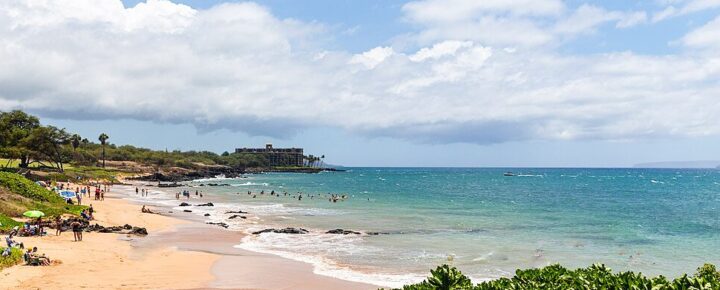Yet another bizarre but not entirely unexpected turn of events is stirring resentment between Maui visitors and some of the island’s community. Now, a recent study is generating strong new pushback against Maui Mayor Bissen’s proposal to significantly reduce vacation rentals.
His initiative followed directly on the heels of a statewide policy change at the hands of Governor Green, which gave counties more autonomy over vacation rental decisions—perhaps enough “rope” for them to hang themselves. Amidst this policy upheaval, an organization, the Travel Technology Association, yesterday released a contentious study emphasizing the economic benefits of STRs, the focal point of this debate.
“Just another example of why politicians shouldn’t make business decisions. They just don’t have the intellectual capability.”
Comment from reader, Michael C
Overview of the Travel Tech economic analysis.
The Travel Technology Association, in collaboration with economic consultants Kloninger & Sims, presented findings that short-term rentals (STRs) generated a staggering $2.2 billion in direct spending by guests on Maui in 2023 alone. The report warns of very substantial economic repercussions if Mayor Bissen’s plan to phase out approximately 7,000 STRs goes forward, predicting big losses in both annual tax revenue as well as significant job cuts across the sector. Your thousands of comments have spoken to these issues.
“Is it possible to commission another study simultaneously that focuses on identifying the current barriers to creating affordable workforce housing for local residents and provides workable recommendations to address the barriers to create affordable housing on Maui?”
Beat of Hawaii reader, Vee
Maui mayor critiques the analysis, saying you’ll move to Maui hotels!
However, Mayor Bissen has challenged the credibility of the study, highlighting that it was commissioned by an organization with direct interests in the survival of the STR industry. He argued that the study has not undergone adequate fact-checking and pointed out that the Travel Technology Association, being an advocate for travel technology businesses, prioritized industry benefits over local residents’ needs.
In response, Mayor Bissen has endorsed a forthcoming study by the Hawaii Economic Research Organization (UHERO) to provide what he surely hopes will be an economic analysis that’s more balanced and favorable to his goals.
“The lack of accountability and gross political pandering has been staggering…not just in Maui but by a state government that has used the short-term rental controversy as a diversion to avoid responsibility for mismanagement.”
Beat of Hawaii reader, James
Community and visitor insights speak
Feedback from residents and visitors gathered from comments on previous articles on this topic paints a complex picture. Many express deep concerns about the potential for job losses and a decrease in visitor spending, largely questioning at every level, the feasibility of converting STR properties into long-term residential housing. A prevalent sentiment among BOH commenters is skepticism towards the mayor’s assurance that eliminating STRs would not deter tourists, who they believe would instead choose destinations other than Maui. The mayor, on the other hand, says that visitors will largely move to high-priced Maui hotels.
“I am an owner at Kamaole Sands and it is not a goldmine like some people seem to think. These changes could devastate many of us who rely on this income.”
Beat of Hawaii reader, Erika L.
Mayor Bissen’s assertion that tourism’s economic activity would simply shift from Maui vacation rentals to Maui hotels—and thereby recoup any lost tax revenue—is met with many questions and significant doubt. Critics argue that such a shift is ridiculously optimistic and fails to account for the unique appeal and convenience that vacation rentals offer to Maui visitor demographics. They fear a significant decline in overall visitor numbers, which could ripple across the Maui economy, affecting every economic sector.
Alternative futures and paths forward collide.
As the debate continues, several alternatives have been suggested that could mitigate the potential negative impacts while addressing the housing shortage. These include tighter regulation of STRs rather than outright elimination, incentives for owners to convert their properties into long-term rentals voluntarily, and stricter enforcement of compliance with existing laws to ensure that STRs operate responsibly and contribute fairly to tax revenues.
That is the approach seemingly underway on Kauai, for example, where taxes on some vacation rentals are likely to see significant increases as a different way to control them.
“The solution to this problem goes back 131 years, when America illegally overthrew the Hawaiian Kingdom. Until that is made Pono, you will never have a just resolution.”
Beat of Hawaii reader, Maka’ala S.
The future of Maui vacation rentals holds profound implications for the island.
As the community and its leaders grapple with these issues, the importance of informed, inclusive decision-making and good governance cannot be overstated. It is crucial that all voices are heard in the upcoming council meetings and public forums to ensure that the final policy outcomes reflect both the economic realities and collective best interests.







The short term vacation rental industry had infinite opportunity to regulate itself. It never did and never will. The industry is just strip mining the islands.
This is so true. Not everyone wants to stay at a stuffie over priced high rise hotel. The tourist will find other destinations other than Maui.
Once that happens Maui will suffer and it will be a long way back.
We are come to Hawaii once a year ourselves from CO for about a week. We have no plans to return if STRs are phased out. We have no interest in staying in a hotel. We would prefer to enjoy the islands like a local ourselves.
Vacationing to Hawaii this coming February.
Was originally planning a 3 week, 3 island trip.
With all the anti tourist sentiment on Maui, it will now be a two island trip to Hawaii/Kauai
Residents of Hawaii/Kauai hate short term vacation rentals as much as Maui folks do.
What planet does the governor live on? As one of those much maligned tourists who has visited Maui yearly since 1992 and stayed in various STR ‘s, I can’t recall a single rental that would be suitable long term family accommodation. STRs are intended to be short term housing and designed accordingly. The sentiment that we will go to an overpriced hotel is laughable. Tourist dollars are portable-we are simply going elsewhere. Maui is off the list. While there is a desperate need for housing those affected by the fire, giving the economy a kick in the gut to the tune of several billion to accomplish this goal is proof that politicians should not make business decisions.
It’s not the governor. It’s the mayor of Maui.
Who wins who loses The losers STR owners ,property managers ,store owners,restaurants, car rentals etc The winners The hotels and the politicians who are in the pockets of the hotels Most STRs are one or two bedroom units hardly an everyday home ,but direct competition to the hotels mmm
As a long time owner on the Big Island, I was thinking about just what my condo generates for the economy.
We live off Island so a property manager is required. So the company I and countless others employ had to have a staff to administer the use of the property. Cleaning personal to keep the unit clean. Handyman to fix periodic issues. And of course, the association of owners who employ people to clean, do gardening, and hire a resident manager to oversee all.
All this employs at a minimum 25 or more people! Just sayin…
And they could work other jobs and pay less for housing if you and people like you stopped renting out residential homes as hotels.
Wait, what?
What other jobs will you run to in a vacation destination?
And what residential homes here are being turned into hotels?
The STRs we are talking about have Always been STRs. They have Never been “residential homes”. This isn’t the same as other communities in the country who have an Actual STR issue in their neighborhoods, not a made-up STR issue like the one they’ve concocted here.
Please explain.
The is a shortage of Bus drivers,County workers,Teachers,Police,Nurses,Plumbers,Retsil clerks , in the community and I think these are the jobs he is referring to
Ah, ok. It’s too bad that those jobs either aren’t interchangeable or they don’t pay as well or are not as steady as the jobs that Robert mentions.
It’s too bad you only think of Hawaii as a vacation destination. People actually live here.
Price of houses will not go down and be affordable. Workers need up there wage by increasing their skill in trades or college.
Affordable housing means someone builds a house and rents at a reduced rate than market rate. What worker voulterrs to work for less? Same as home owner renting for less.
Are they doing this because the people who lost homes had no insurance to rebuild?
With politicians, they seldom seem to have a yes plan, just a no plan. Easy to say no, but what is the plan to fix the hole in the economy when banning activity which provides needed tax/biz revenue? Back of napkin math that politicians rarely seem to do. 7,000 STRs, x 5 day average stay, x $4,000 per stay x 40 stays per year. 5.6BN in economic benefit to the Island. With a tax take rate of assumed %20, likely low, that’s a at least a billion in taxes. Sure some will still visit and stay in hotels, which are already annually averaging 60% to 70% occupancy, can only absorb a fraction of the demand. Lets say Maui loses only 1BN of tax revenue. 1/8th of what it collects. What is the plan there guvment? And.. Will 1mm condos now be converted to locals housing? LOL..